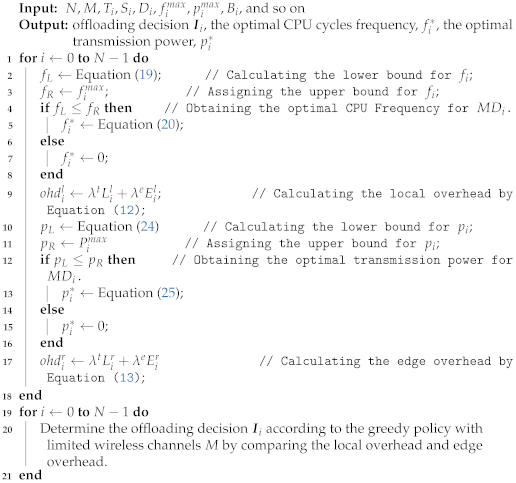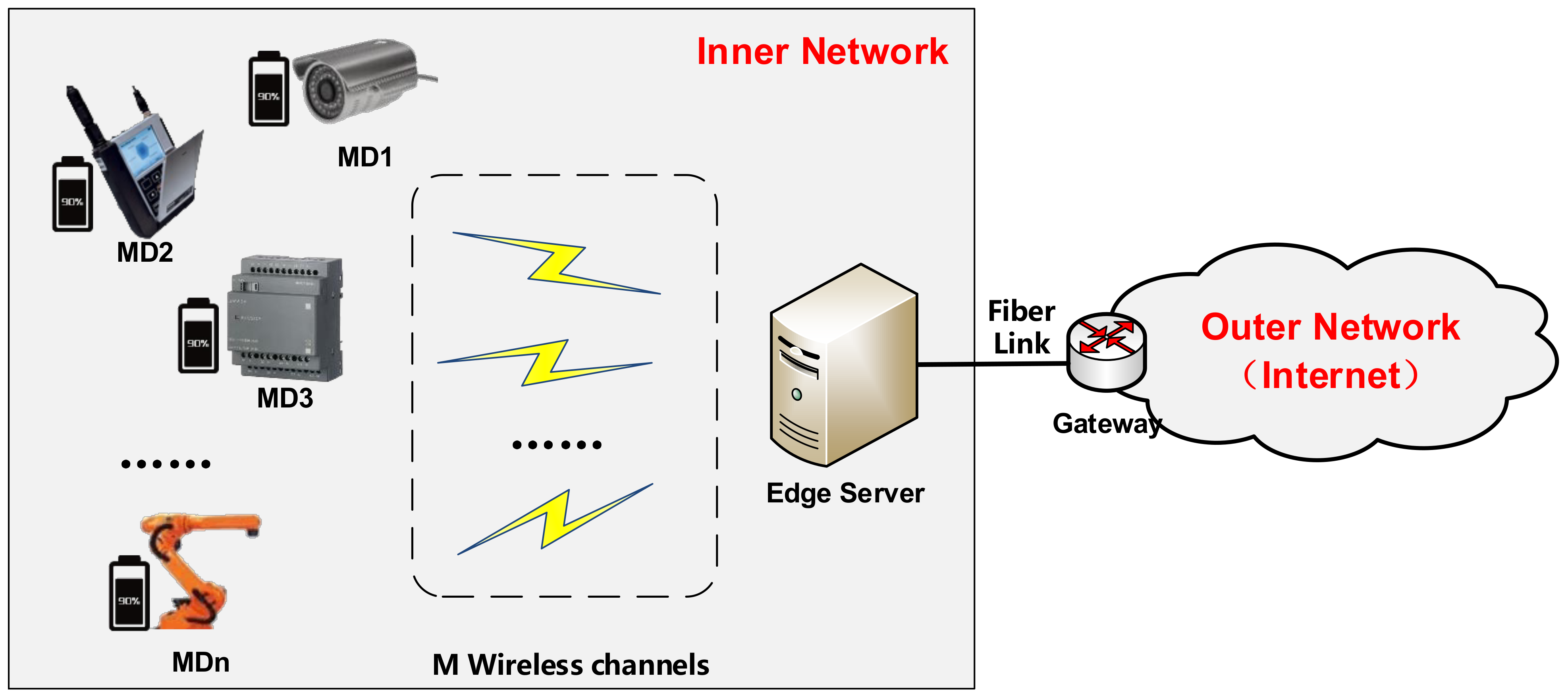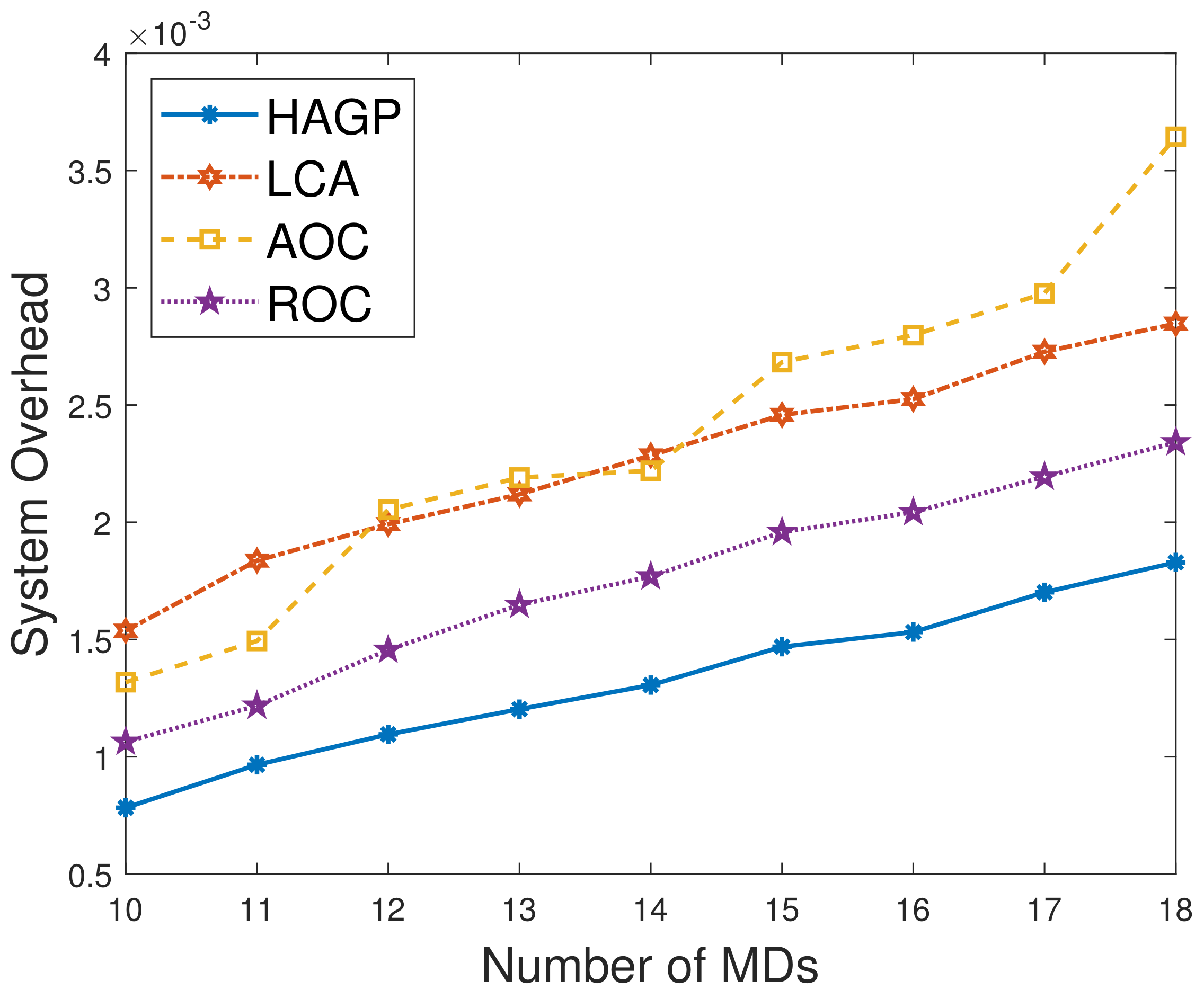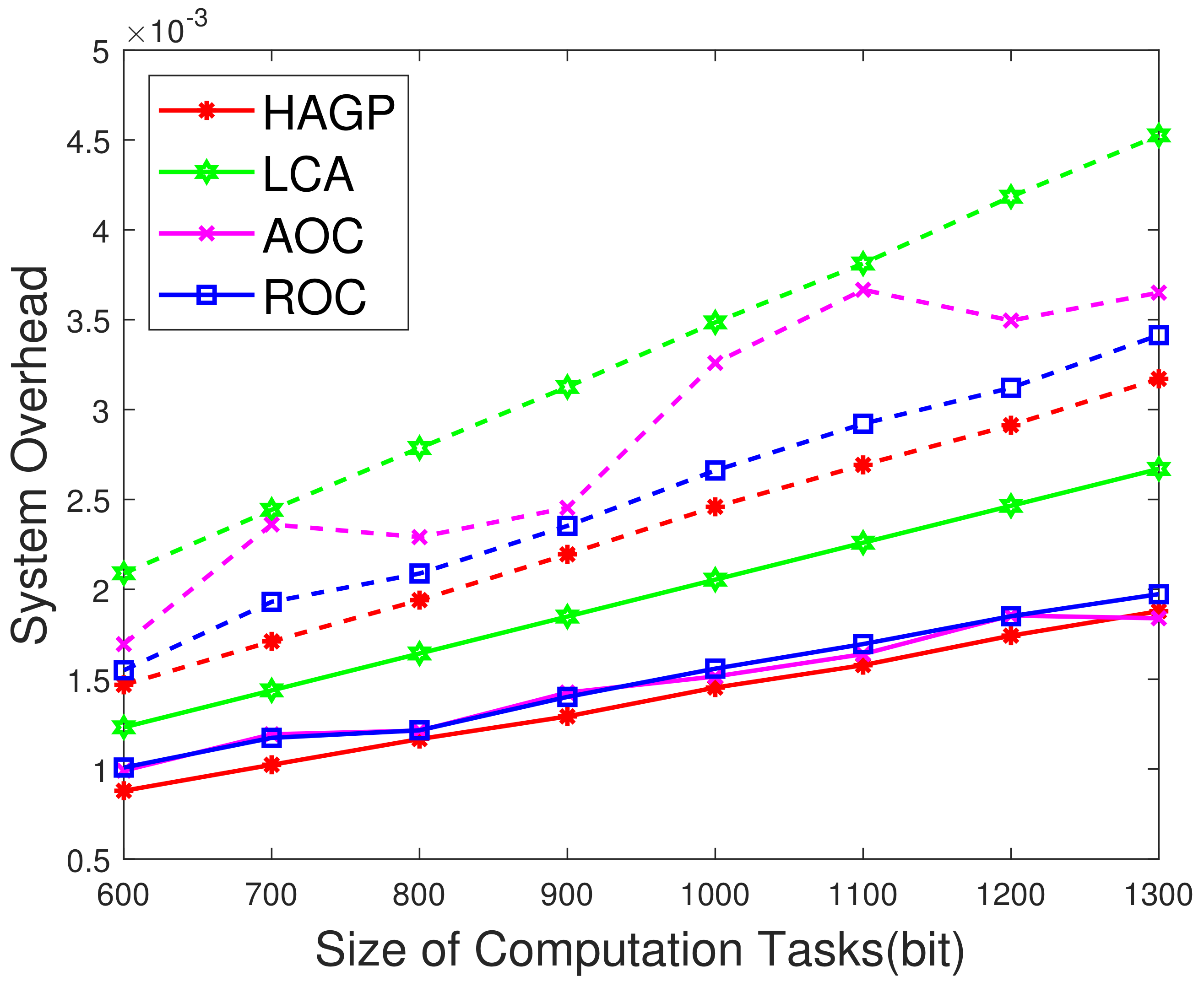HAGP: A Heuristic Algorithm Based on Greedy Policy for Task Offloading with Reliability of MDs in MEC of the Industrial Internet
Abstract
:1. Introduction
- We consider a computation task offloading scenario with an edge server and multiple heterogeneous MDs, where a different type of computation task is randomly requested by each MD, and the computing power of the edge server is constrained by the number of channels existing between MDs and the edge server, by which they can exchange data and information.
- We define the reliability of MDs as the residual energy of MDs after completing a computation task and formulate the problem of computation task offloading in this scenario as a mixed integer non-linear programming (MINLP) problem.
- We solve the problem with alternating optimization (AP) methods and, based on these, propose and design a heuristic algorithm, HAGP, to make decisions for processing computation tasks on MDs, which would minimize the system overhead consisting of the weighted sum of the process time delay and energy consumption.
- We conduct extensive simulation experiments and theoretically analyze the results to verify the performance and confirm the advantages of HAGP by comparing with several baseline algorithms.
2. System Models
2.1. Overall System Model
2.2. Local Computing
2.3. Remote Computing
2.3.1. Communication Model
2.3.2. Remote Computing
2.4. Process Latency Model
2.5. Energy Consumption Model
2.6. Reliability Model
3. Problem Formulation
4. Problem Solving and Algorithm Designing
4.1. Problem Solving
4.1.1. Optimal CPU Cycle Frequency
4.1.2. Optimal Transmission Power
4.1.3. Optimal Offloading Decision
4.2. Algorithm Designing
| Algorithm 1: Heuristic Algorithm based on Greedy Policy for Task Offloading (HAGP) |
 |
5. Simulation Results
5.1. Simulation Settings
- Local Computing All (LCA). This means all the computation tasks generated by MDs are processed locally, which will not cause an overhead of the communication and computation on the edge server.
- Randomly Offloading Computing (ROC). In this case, computation tasks requested by MDs are considered to be processed locally or offloaded to the edge server for completion. The offloading decision of each MD can be presented as a binary number, which is generated randomly.
- ALL Offloading Computing (AOC). The algorithm requires all computation tasks on the MDs to be offloaded to the edge server for processing, which would consume the energy of MDs to transmit the data included in the computation tasks and the time delay during the computation tasks’ completion.
5.2. Analysis of Simulation Results
- (1)
- The relationships of iterations and overall system overhead. To ensure the simulation experiments are adaptable to different scenarios, some significant variables in this paper are given to obey a certain distribution, and MDs are heterogeneous. Therefore, to ensure the stability and accuracy, we define the overall system overhead as the average system overhead from multiple simulation results. As shown in Figure 2a, the overall system overhead of HAGP fluctuates with the number of iterations and converges from the 31st iteration. Similarly, it can be drawn from Figure 2b,c that the overall system overheads of LCA and ROC start to converge from the 43rd and 47th iterations, respectively. However, for AOC, the system overhead fluctuates within a very small range since the waiting time of computation tasks changes with the channel gain between MDs and the edge server. Therefore, for convenience, all the results of experiments in the paper adopt the average value of 50 iterations, which would satisfy the convergence of all algorithms.
- (2)
- Impact of the number of MDs on overall system overhead. The relationship between the overall system overhead and the number of MDs is shown in Figure 3. It can be observed that, with the same simulation parameters given in Table 2, HAGP achieved the smallest overall system overhead compared with three baseline algorithms, including LCA, AOC, and ROC. This is because the computation task with the largest local execution overhead is chosen to be offloaded in HAGP, while the overhead consumed by offloading to the edge server is much smaller than that generated locally. Furthermore, when the number of wireless channels in the system remains unchanged, with the number of MDs increasing from 10 to 18, the overall system overhead becomes larger and larger in all algorithms. This is because the overall overhead of the system is closely related to the number of MDs in the system, that is, the more MDs, the more computation tasks it handles, and accordingly, the greater the overall system overhead.
- (3)
- Impact of the number of wireless channels on overall system overhead. To illustrate the impact of the number of wireless channels on the overall system overhead, we set some system parameters included in the MEC system as follows: the number of MDs is 30, the size of the computation task is 1000 bit, the distance between MDs and the edge server is 50 m, the weighted coefficient of the time delay is 0.8, and the number of wireless channels ranges from 14 to 30. As presented in Figure 4, the overall system overhead in MEC decreases with the increasing number of wireless channels in several offloading algorithms, such as HAGP, AOC, and ROC, while it does not fluctuate too much in LCA. This is because the overall system overhead of LCA is irrelevant as the wireless channels for the computation tasks are all processed locally without transmitting data to the edge server. Thus, the overall system overhead is only decided by the heterogeneous computing capacity of MDs, which has a small value range listed in Table 2. However, the computing overhead consumed by the offloading computing model is much smaller than local processing; therefore, the greater the number of wireless channels, the more computation tasks will be offloaded, and the less the overall system overhead will be. Meanwhile, it can be found that when the number of wireless channels infinitely approaches the number of MDs, the overall system overhead converges to a fixed value.
- (4)
- Impact of distances and weighted coefficients on overall system overhead.Figure 5 shows the effects of two different factors of the MEC system in this paper, including distances between MDs and the edge server and the weighted coefficient of the processing latency. To obtain the relationship between these two different factors and the system overhead accurately, we set other parameters to be fixed with 50 iterations. Firstly, we can see that when the weighted coefficients remain unchanged, the overall system overhead increases with the increasing distances for several offloading algorithms, including HAGP, RCA, and ROC, while it stays the same for LCA. This is because computation tasks are all processed locally, which is irrelevant to the location of MDs from the edge server, while the distances affect the channel gain between MDs and the edge server according to Equation (4), which determines the transmission rate of offloading tasks as an important component. Secondly, for three offloading algorithms with the same weighted coefficient, the overall system overhead of HAGP is always lower than the other two. At the same time, as the distances increase, the overall system overhead of AOC increases the most. By analyzing, it can be observed that AOC is mainly affected by the waiting latency of computation tasks for limited wireless channels, while HAGP and ROC can be chosen to execute locally. Finally, for all algorithms, the overall system overhead with a coefficient equal to 0.8 is higher than that with 0.2. The reason is that the weighted coefficient represents the proportion of time latency in the overall system overhead, while the distances are closely related to the time latency. Therefore, the weighted coefficient is larger, and the overall system overhead is higher.
- (5)
- Impact of computation task size and weighted coefficients on overall system overhead. According to (11), it can be found that the reliability of MDs is inversely proportional to the maximum size of the computation tasks. Therefore, we conducted many simulation experiments with different maximum sizes of the computation task, ranging from 600 to 1300 (bits). As described in Figure 6, the overall system overhead increases with the increasing maximum size of the computation tasks. This is because, as the maximum size of the computation tasks increases, the reliability of the MDs will decrease. At this time, the probability of the task being re-requested or discarded will increase, and accordingly, the overall system overhead will increase. In addition, when , the energy consumption is a metric paid more attention in the system overhead. Therefore, the size of computation tasks is considered to show a decreasing relationship between the system overhead and the weighted coefficient of energy consumption. In other words, when decreases, the system overhead increases, which is consistent with Figure 5. In addition, it is observed that HAGP will obtain the minimal overall system overhead compared with the other classical algorithms under the same maximum size of computation tasks.
- (6)
- Comparison of HAGP and HAGP without considering the reliability of MDs. In this paper, the authors studied task offloading with the reliability of MDs for MEC in the Industrial Internet. Therefore, the impact of the reliability of MDs on the system overhead is an important metric to certify the performance of HAGP. As shown in Figure 7, the comparisons of HAGP and HAGP without considering the reliability of MDs (termed as HAGP-NR) with different weighted coefficients are listed. Obviously, the overall system overhead of HAGP is lower than HAGP-NR in all figures, including Figure 7a–c, where the weighted coefficient is 0.8, 0.5, and 0.2, respectively. This is because for HAGP, it can determine whether the MD is reliable before the task is executed, i.e., when the MD is reliable, it is performed and causes the system overhead; otherwise, it is not performed. However, for HAGP-NR, the computation tasks are processed regardless of whether the MD is reliable. At this time, once the MD is unreliable, the task being executed will not only be disrupted and discarded but will also consume a little more system overhead than HAGP, that is, no matter whether the MD is reliable to process the computation task, the system overhead will be incurred. In a nutshell, compared with HAGP-NR, HAGP can save the corresponding system overhead by judging the reliability of the MD. In addition, since is the weighted coefficient of energy consumption in the system overhead, only the total value of the system overhead in all three figures changes, and the comparison trend of HAGP and HAGP-NR does not change.
6. Conclusions
Author Contributions
Funding
Institutional Review Board Statement
Informed Consent Statement
Data Availability Statement
Acknowledgments
Conflicts of Interest
References
- Kaur, K.; Garg, S.; Aujla, G.; Kumar, N.; Rodrigues, J.; Guizani, M. Edge computing in the industrial internet of things environment: Software-defined-networks-based edge-cloud interplay. IEEE Commun. Mag. 2018, 56, 44–51. [Google Scholar] [CrossRef]
- Zielonka, A.; Sikora, A.; Woźniak, M.; Wei, W.; Ke, Q.; Bai, Z. Intelligent Internet of Things System for Smart Home Optimal Convection. IEEE Trans. Ind. Inform. 2020, 17, 4308–4317. [Google Scholar] [CrossRef]
- Wang, Y.; Wang, L.; Zheng, R.; Zhao, X.; Liu, M. Latency-Optimal Computational Offloading Strategy for Sensitive Tasks in Smart Homes. Sensors 2021, 21, 2347. [Google Scholar]
- Guo, M.; Chen, Y.; Shi, J.; Zhang, Y.; Wang, W.; Zhao, L.; Chen, L. A Perspective of Emerging Technologies for Industrial Internet. In Proceedings of the 2019 IEEE International Conference on Industrial Internet (ICII), Orlando, FL, USA, 11–12 November 2019; pp. 338–347. [Google Scholar]
- Zhang, J.; Qu, G. Physical Unclonable Function-Based Key Sharing via Machine Learning for IoT Security. IEEE Trans. Ind. Electron. 2019, 67, 7025–7033. [Google Scholar] [CrossRef]
- Shi, W.; Cao, J.; Zhang, Q.; Li, Y.; Xu, L. Edge Computing: Vision and Challenges. IEEE Internet Things J. 2016, 3, 637–646. [Google Scholar] [CrossRef]
- Kumar, K.; Liu, J.; Lu, Y.; Bhargava, B. A Survey of Computation Offloading for Mobile Systems. Mob. Netw. Appl. 2013, 18, 129–140. [Google Scholar] [CrossRef]
- Wang, Y.; Min, S.; Wang, X.; Liang, W.; Li, J. Mobile-Edge Computing: Partial Computation Offloading Using Dynamic Voltage Scaling. IEEE Trans. Commun. 2016, 64, 4268–4282. [Google Scholar] [CrossRef]
- Barbera, M.; Kosta, S.; Mei, A. To offload or not to offload? The bandwidth and energy costs of mobile cloud computing. In Proceedings of the 2013 Proceedings IEEE INFOCOM, Turin, Italy, 14–19 April 2013; pp. 1285–1293. [Google Scholar]
- Li, L.; Wen, X.; Lu, Z.; Jing, W. An Energy Efficient Design of Computation Offloading Enabled by UAV. Sensors 2020, 20, 3363. [Google Scholar]
- Mao, Y.; Zhang, J.; Letaief, K. Dynamic Computation Offloading for Mobile-Edge Computing with Energy Harvesting Devices. IEEE J. Sel. Areas Commun. 2016, 34, 3590–3605. [Google Scholar] [CrossRef] [Green Version]
- Mach, P.; Becvar, Z. Mobile Edge Computing: A Survey on Architecture and Computation Offloading. IEEE Commun. Surv. Tutor. 2017, 19, 1628–1656. [Google Scholar] [CrossRef] [Green Version]
- Mao, Y.; You, C.; Zhang, J.; Huang, K.; Letaief, K. A Survey on Mobile Edge Computing: The Communication Perspective. IEEE Commun. Surv. Tutor. 2017, 19, 2322–2358. [Google Scholar] [CrossRef] [Green Version]
- Dong, L.; Wu, W.; Guo, Q.; Satpute, M.; Du, D. Reliability-Aware Offloading and Allocation in Multilevel Edge Computing System. IEEE Trans. Reliab. 2019, 70, 200–211. [Google Scholar] [CrossRef]
- Huang, M.; Zhai, Q.; Chen, Y.; Feng, S.; Shu, F. Multi-Objective Whale Optimization Algorithm for Computation Offloading Optimization in Mobile Edge Computing. Sensors 2021, 21, 2628. [Google Scholar] [CrossRef]
- Lyu, X.; Hui, T.; Sengul, C.; Ping, Z. Multiuser Joint Task Offloading and Resource Optimization in Proximate Clouds. IEEE Trans. Veh. Technol. 2017, 66, 3435–3447. [Google Scholar] [CrossRef]
- Eshraghi, N.; Liang, B. Joint Offloading Decision and Resource Allocation with Uncertain Task Computing Requirement. In Proceedings of the IEEE INFOCOM 2019—IEEE Conference on Computer Communications, Paris, France, 29 April–2 May 2019; pp. 1414–1422. [Google Scholar]
- Xu, C.; Lei, J.; Li, W.; Fu, X. Efficient Multi-User Computation Offloading for Mobile-Edge Cloud Computing. IEEE/Acm Trans. Netw. 2016, 24, 2795–2808. [Google Scholar]
- Liu, J.; Zhang, Q. Offloading Schemes in Mobile Edge Computing for Ultra-Reliable Low Latency Communications. IEEE Access 2018, 6, 12825–12837. [Google Scholar] [CrossRef]
- Liu, C.; Bennis, M.; Poor, H. Latency and Reliability-Aware Task Offloading and Resource Allocation for Mobile Edge Computing. In Proceedings of the 2017 IEEE Globecom Workshops (GC Wkshps), Singapore, 4–8 December 2017; pp. 1–7. [Google Scholar]
- Yan, H.; Li, Y.; Zhu, X.; Zhang, D.; Wang, J.; Chen, H.; Bao, W. EASE: Energy-efficient task scheduling for edge computing under uncertain runtime and unstable communication conditions. Concurr. Comput. Pract. Exp. 2019, 33. [Google Scholar] [CrossRef]
- Chen, M.; Liang, B.; Dong, M. Joint offloading and resource allocation for computation and communication in mobile cloud with computing access point. In Proceedings of the IEEE INFOCOM 2017—IEEE Conference on Computer Communications, Atlanta, GA, USA, 1–4 May 2017; pp. 1–9. [Google Scholar]
- Wang, C.; Liang, C.; Yu, F.; Chen, Q.; Lun, T. Computation Offloading and Resource Allocation in Wireless Cellular Networks With Mobile Edge Computing. IEEE Trans. Wirel. Commun. 2017, 16, 4924–4938. [Google Scholar] [CrossRef]
- Guo, H.; Zhang, J.; Liu, J.; Zhang, H. Energy-aware computation offloading and transmit power allocation in ultradense IoT networks. IEEE Internet Things J. 2018, 6, 4317–4329. [Google Scholar] [CrossRef]
- Goldsmith, A. Capacity of Wireless Channels. In Wireless Communications; Cambridge University Press: Cambridge, UK, 2005; pp. 99–125. [Google Scholar]
- Sikora, A.; Woniak, M. Impact of Current Pulsation on BLDC Motor Parameters. Sensors 2021, 21, 587. [Google Scholar] [CrossRef]
- Li, J.; Yu, F.; Deng, G.; Luo, C.; Ming, Z.; Yan, Q. Industrial Internet: A Survey on the Enabling Technologies, Applications, and Challenges. IEEE Commun. Surv. Tutor. 2017, 19, 1504–1526. [Google Scholar] [CrossRef]
- Wozniak, M.; Zielonka, A.; Sikora, A.; Piran, M.J.; Alamri, A. 6G-enabled IoT Home Environment control using Fuzzy Rules. IEEE Internet Things J. 2020, 8, 5442–5452. [Google Scholar] [CrossRef]
- Miettinen, A.; Nurminen, J. Energy efficiency of mobile clients in cloud computing. In Proceedings of the 2nd USENIX Conference on Hot Topics in Cloud Computing, Usenix Association, Boston, MA, USA, 22–25 June 2010; pp. 4–13. [Google Scholar]
- Wen, Y.; Zhang, W.; Luo, H. Energy-optimal mobile application execution: Taming resource-poor mobile devices with cloud clones. In Proceedings of the 2012 Proceedings IEEE INFOCOM, Orlando, FL, USA, 25–30 March 2012; pp. 2716–2720. [Google Scholar]
- Zhao, H.; Deng, S.; Zhang, C.; Du, W.; Yin, J. A Mobility-Aware Cross-Edge Computation Offloading Framework for Partitionable Applications. In Proceedings of the 2019 IEEE International Conference on Web Services (ICWS), Milan, Italy, 8–13 July 2019; pp. 193–200. [Google Scholar]
- Yi, C.; Cai, J.; Su, Z. A Multi-User Mobile Computation Offloading and Transmission Scheduling Mechanism for Delay-Sensitive Applications. IEEE Trans. Mob. Comput. 2020, 19, 29–43. [Google Scholar] [CrossRef]
- Songtao, G.; Jiadi, L.; Yuanyuan, Y.; Bin, X.; Zhetao, L. Energy-Efficient Dynamic Computation Offloading and Cooperative Task Scheduling in Mobile Cloud Computing. IEEE Trans. Mob. Comput. 2018, 18, 319–333. [Google Scholar]
- Su, H.; Zhang, X. Optimal transmission range for cluster-based wireless sensor networks with mixed communication modes. In Proceedings of the 2006 International Symposium on a World of Wireless, Mobile and Multimedia Networks (WoWMoM’06), Buffalo-Niagara Falls, NY, USA, 26–29 June 2006; pp. 250–257. [Google Scholar]
- Chong, E.K.; Zak, S.H. An Introduction to Optimization. Antennas Propag. Mag. IEEE 2013, 38, 1–60. [Google Scholar]
- Boyd, S.; Vandenberghe, L.; Faybusovich, L. “Convex Optimization”. IEEE Trans. Autom. Control. 2006, 51, 1859. [Google Scholar]







| Symbols | Description |
|---|---|
| The set of MDs (the number of elements in set) | |
| The set of wireless communication channels (the number of elements in set) | |
| Q | The number of CPU cycle frequency for processing one bit data |
| The computation task requested by | |
| () | The (maximum) size of the computation task requested by (in bit) |
| The deadline of the computation task (in ms) | |
| The indicator of whether the computation task on is offloaded, where | |
| The distance between and the edge server (in m) | |
| The channel gain between and the edge server during the transmission of the computation task | |
| () | The (maximum) frequency of to process the computation task locally (in Hz) |
| () | The (maximum) transmission power of to transmit the computation task (in w) |
| The execution latency of the computation task , where (in ms) | |
| The battery capacity of (in J) | |
| The energy consumption of the computation task , where (in J) |
| Parameter | Value | Parameter | Value |
|---|---|---|---|
| [0.8,1.9] (GHz) | 1 (MHz) | ||
| 1000 (bit) | Q | 737.5 (CPB) | |
| 1 (W) | (W) | ||
| [] (J) | |||
| 0.002 (ms) | −40 (dB) | ||
| (0,50] (m) | |||
| 0.002 (ms) | 0.001 (mJ) |
| Algorithms | Number of MDs | Number of Edge Servers | Reliability | Objective Function |
|---|---|---|---|---|
| RLT-based [19] | 1 | N | transmission reliability | product of total latency and the transmission reliability |
| DLRAP [20] | N | M | reliability of tasks | the energy consumption of computing and transmission |
| EASE [21] | N | M | reliable computing mode | the energy consumption of the system |
| HAGP | N | 1 | reliability of MDs | the weighted sum of time delay and energy consumption |
Publisher’s Note: MDPI stays neutral with regard to jurisdictional claims in published maps and institutional affiliations. |
© 2021 by the authors. Licensee MDPI, Basel, Switzerland. This article is an open access article distributed under the terms and conditions of the Creative Commons Attribution (CC BY) license (https://creativecommons.org/licenses/by/4.0/).
Share and Cite
Guo, M.; Huang, X.; Wang, W.; Liang, B.; Yang, Y.; Zhang, L.; Chen, L. HAGP: A Heuristic Algorithm Based on Greedy Policy for Task Offloading with Reliability of MDs in MEC of the Industrial Internet. Sensors 2021, 21, 3513. https://doi.org/10.3390/s21103513
Guo M, Huang X, Wang W, Liang B, Yang Y, Zhang L, Chen L. HAGP: A Heuristic Algorithm Based on Greedy Policy for Task Offloading with Reliability of MDs in MEC of the Industrial Internet. Sensors. 2021; 21(10):3513. https://doi.org/10.3390/s21103513
Chicago/Turabian StyleGuo, Min, Xing Huang, Wei Wang, Bing Liang, Yanbing Yang, Lei Zhang, and Liangyin Chen. 2021. "HAGP: A Heuristic Algorithm Based on Greedy Policy for Task Offloading with Reliability of MDs in MEC of the Industrial Internet" Sensors 21, no. 10: 3513. https://doi.org/10.3390/s21103513
APA StyleGuo, M., Huang, X., Wang, W., Liang, B., Yang, Y., Zhang, L., & Chen, L. (2021). HAGP: A Heuristic Algorithm Based on Greedy Policy for Task Offloading with Reliability of MDs in MEC of the Industrial Internet. Sensors, 21(10), 3513. https://doi.org/10.3390/s21103513






